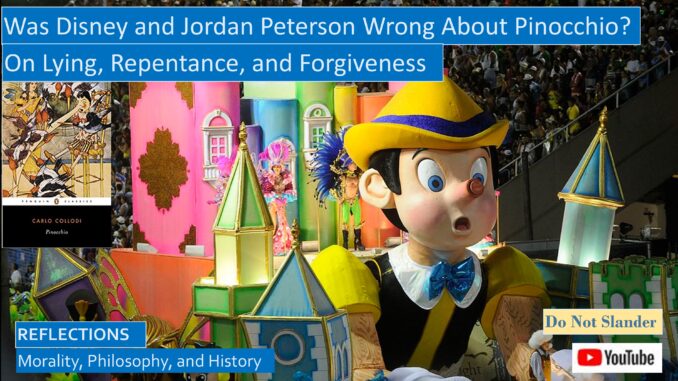
What can we learn by reflecting on the original Pinocchio story, written by Carlo Collodi in the late 1800s?
Does the Pinocchio story retell the story of the Golden Ass, the ancient Roman novel where Lucius is magically transformed into a donkey, and back again?
How does the original Pinocchio differ from the Pinocchio in the Disney movie, also referenced by Jordan Peterson?
How does the original Pinocchio story reflect the monastic ideals of obedience and repentance?
Script for this video, with Amazon book links: https://www.slideshare.net/BruceStrom1/hhesiods-works-and-days-possible-ancient-inspiration-for-pinocchio
YouTube video: https://youtu.be/HH9t2eTh8RE
GEPPETTO CARVES A TALKING, MAGICAL PUPPET
The original Pinocchio was very different from the happy-go-lucky Disney and Jordan Peterson Pinocchio. Although the Disney movie included the most memorable most memorable stories of the original, the short length of the movie fails to render the deeply penitential tone of the original, which emphasizes how daily struggle is needed to replace bad habit with good habits, how salvation and spiritual growth is never instantaneous but is rather a life long-term process, where for every two steps forward we take one step backwards. The original rebellious Pinocchio was much more of a rogue than the pleasant Disney, he is a juvenile delinquent from the moment he has been carved.
Another difference is the original Pinocchio lives in a magical land much like that described by Apuleius in the Golden Ass. In the Disney version, there’s only one magical puppet, Pinocchio, but in the original version magical puppets are not unusual. In the original Pinocchio, the blue fairy is not a little Tinker Bell character but is a full-grown fairy and a main character in the story.
When Geppetto asks his friend, Master Cherry, for wood to “make a beautiful wooden puppet” “that would know how to dance, to fence, and to leap like an acrobat,” he gave him an enchanted piece of wood that complains when you try to chisel and plane it. Geppetto brings this piece of wood home to his humble abode, which was a “small ground floor room that was lighted only from the staircase. The furniture could not have been simpler: a bad chair, a poor bed, and a broken-down table at the end of the room.”
Geppetto “took his tools and set to work to cut out and model his puppet.” “He first made his hair, then his forehead, then his eyes. When the eyes were finished, he was astonished when they moved and looked fixedly at him.” “He then carved the nose, but no sooner had he made it then he began to grow. And it grew, and grew, and grew, until in a few minutes it had become an immense nose that seemed as if it would never end. Poor Geppetto tired himself with cutting it off.”
“The mouth was not even completed when it began to laugh and deride him.” “Then he fashioned the chin and the throat, then the shoulders, the stomach, the arms, and the hands. The hands were scarcely finished when Geppetto felt his wig snatched from his head. He turned around and” “saw his yellow wig in the puppets hand.” He yells at the puppet, “You young Rascal! You aren’t even not yet completed and you’re already beginning to show want of respect to your father!” as he dried a tear from his eye. “When Geppetto had finished the feet, he received a kick on his nose.” “When his legs became flexible Pinocchio began to walk by himself and to run about the room; until, having gone out the house door, he ran jumped into the street and escaped.”[1]
After getting into some mischief Pinocchio returned home while Geppetto was out. He was startled and looked up to where he heard a voice and asked who this was. The response: “I am the talking cricket and I’ve lived in this room a hundred years and more.”
Pinocchio protested, “Now this room is mine,” so please leave.
The cricket answered, “I will not go until I’ve told you a great truth.” “Those boys who rebel against their parents and run away capriciously from home will never come to any good in the world, and they will eventually repent bitterly.”
After telling the cricket he has no desire to attend school, that he would rather “run after butterflies or to climb trees or to take young birds out of their nests.” Pinocchio was angered by the cricket’s continuing lectures and flattened the cricket against the wall by throwing his hammer at him.[2]
After some misadventures, Geppetto arrives home. Pinocchio announces that he will go to school the next day, but he needs some school clothes. “Geppetto, who was poor, and who had not so much as a farthing in his pocket, then made him a little dress of flower paper, a pair of shoes from the bark of a tree, and a cap of the crumb of bread, which thrills the little puppet.”
Then Pinocchio says he has no spelling book. So Geppetto, “putting on his old fustian coat, all patched up and darned, ran out of the house. He returned shortly, holding in his hand a spelling book for Pinocchio, but his old coat was gone. The poor man was in his shirt sleeves” in the snow. Touched by his generosity, “Pinocchio threw his arms around Geppetto’s neck, he kissed him again and again.”[3]
We can deduce several truths about European peasant life in several centuries past. First, peasants and shopkeepers were so desperately poor that they likely bartered when they ran short of money. The fact that this story is set in a magical land suggests that the peasants were quite superstitious.
The next day, on the way to school, Pinocchio sees a sign for the great puppet theater, and he wants to buy a ticket. What did Pinocchio do? Of course, he sells the spelling book to buy a ticket to see the puppet show![4] The arguing puppets in the show, Harlequin and Punchinello, seeing our mischievous puppet, shout, “Pinocchio! Our brother Pinocchio!” While Pinocchio joined the puppets on stage for dancing and hugs and celebration, the crowd hisses and boos, for the play had been interrupted! But after he ruined the show, the showman is so upset that he threatens to feed his cooking fire with his puppet Harlequin, who had allowed Pinocchio to ruin his show. Pinocchio then begged to be put to the flames instead, sparing Harlequin.[5]
The fire eater of the circus witnessed this unexpected offer of self-sacrifice by this rogue puppet and has pity on him. When he asks about his father, and how he earns his money, Pinocchio responds, “My father never has a penny in his pocket. Why, to buy a spelling book for me to go to school, he was obliged to sell the only coat he had to wear, a coat that between patches and darns, was barely fit to wear.” This so affected the fire-eater that he gave the rogue puppet five gold coins to give to his father.
But then Pinocchio runs into the two scoundrels, the fox and the cat also depicted by Disney. How do they tempt our lay-about puppet Pinocchio? That all he needs to do is bury those five gold pieces in the field of riches in the village down the road, that overnight they will multiply into 2,500 gold pieces, which has Pinocchio dancing for joy! This is like today’s Nigerian prince who promises you a million dollars if you will only pay the hundred-dollar export fee. But after they spend one gold piece at a sumptuous meal for three at the tavern, he only has four gold pieces, but then two thousand dollars is still worth waiting for overnight.
That night an insect, dimly seen on the bark of the tree, the ghost of the talking cricket, warns Pinocchio, “Don’t trust, my boy, those who promise to make you rich in a day! Usually they’re either mad, or rogues. Hear me, go back!” “The cricket then says, ‘Good night, Pinocchio, and may heaven preserve you from dangers and assassins.’ No sooner had he said these words,” “than the road became darker than ever.”[6]
Just as the cricket predicted Pinocchio, meets up with the assassins on the dark road, telling them he has no money, and when they try to pry the money out of his wooden mouth, he “caught a hand with his teeth, and with one bite, bit it clean off, and spat it out. Imagine his astonishment when, instead of a hand, he perceived that he’d spat out a cat’s paw!”[7]
PINOCCHIO AND HIS SISTER WITH THE BLUE HAIR
Pinocchio managed to break free, “and after a desperate chase of two hours through the green woods,” “he came to a small house in the woods a small house white as snow.” He banged on the door desperately when he saw “a beautiful child in the window, she had blue hair and a face that was waxen white, eyes closed, with her hands crossed.”
She said, “In this house there is no one, they’re all dead.” Then the assassins caught up with Pinocchio and hung him from a noose thrown over the limb of a tree. They waited for him to die, but after he struggled and kicked for three hours they left, saying goodbye till tomorrow.[8]
The beautiful child with blue hair came again to the window and saw poor Pinocchio hanging from a branch of the big oak, more dead than alive. She was moved by compassion. “Striking her hands together, she made three little claps.” She instructed the birds and the animals of the forest to bring her the poor Pinocchio and had him placed on a little bed.
She asked the three doctors of the forest to examine him: the crow, the owl, and the talking cricket. After Pinocchio “was seized with a fit of convulsive trembling,” “the talking cricket said, ‘That puppet there is a confirmed rogue,’ ‘a ragamuffin, a do nothing, a vagabond, .’a disobedient son who will make his poor father die of a broken heart.’” From beneath the covers, they heard our puppet crying.
Our crow doctor said solemnly, “When the dead person cries, it is a sign that he is on the road to get well.”
The owl doctor added, “I grieve to contradict my illustrious friend and colleague, but for me, when the dead person cries, it is a sign that he is sorry to die.”[9]
These three doctors prescribed bitter medicine to cure our ailing puppet, but of course, our puppet refused his medicine. So, “the door of the room flew open, and four rabbits, black as ink, entered carrying on their little shoulders a little funeral bier,” which frightened our protesting Pinocchio.
The biggest rabbit said, “You only have a few minutes to live, as you have refused the medicine which would have cured you of your fever.” This made Pinocchio eager to take his medicine, causing our black rabbits to sigh. “’We must have patience! We have made our journey in vain,’ after taking the little funeral bier again on their shoulders, they left the room grumbling and murmuring between their teeth.”
Then the blue fairy asked Pinocchio about how he came to be swinging on the tree. He told her the complete story, in detail, until he came to the final detail of the remaining gold coins. When he said the four gold coins in his pocket had been lost, “his nose, which was already long, grew at least two fingers longer.” When he said he lost them in the wood, his nose grew some more. When the blue fairy said she could find anything in her woods, his story changed, he had swallowed them with his medicine.
“His nose then grew to such an extraordinary length that the poor Pinocchio could not move in any direction. When he turned to one side, he struck his nose against the bed or the windowpanes. When he turned to the other, his nose he struck the wall or the door. When he raised his head,” he risked sticking it into the eye of his protector. When she laughed at him, he asked why.
“Lies, my dear boy, are found out immediately, because there are two sorts of lies, lies that have short legs, and lies that have long noses.”[10]
Our fairy with blue hair let Pinocchio roar and cry for half an hour, “but then she had pity on him, clapped her hands, and a thousand woodpeckers flew and perched on his nose. They pecked with such zeal that in a few minutes his enormous and ridiculous nose was reduced to its former size. The puppet, drying his eyes, said ‘How much I love you!’
‘I love you also,’ answered the fairy, ‘and if you will remain with me, you shall be my little brother and I shall be your good little sister,’ and said that his Papa would join them tonight.” He was so eager to meet his Papa that our fair with the blue hair let him go, asking him to be careful.
But then, whom do you think Pinocchio meet on this sparsely traveled road? None other than the scoundrels, the fox and the cat, who reminded our puppet of their field of miracles, that overnight will grow four gold coins into two thousand gold coins. And we all know what happens to gold coins that have been planted in the field of miracles.[11]
When Pinocchio learns he has been robbed, he pleads his case before the forest court. The big ape who was the judge has him thrown into jail for his foolishness, until he is released under a general amnesty four months later.[12] After more misadventures spanning three more chapters,[13] he finally starts trudging back to the little white house of the good fairy with the blue hair, he wonders how angry she and his Papa will be.
Our rogue puppet is now “determined to change and become orderly and obedient, for at last I’ve seen that disobedient boys will come to no good and gain nothing.” He is now eager “to embrace him and to cover his Papa with kisses,” “hoping for his and the good fairy’s forgiveness of such an ungrateful boy Will the fairy forgive me my bad conduct to her? To think of all the kindness and loving care I received from her,” “it be possible to find a more ungrateful boy and one with less heart than I have.”[14]
When he arrives, in place of the little white House he saw a “marble stone, on which were engraved these sad words:
‘Here lies the child with the blue hair, who died from sorrow, because she was abandoned by her little brother Pinocchio.’ He fell with his face on the ground, covering the covering the tombstone with a thousand kisses, burst into an agony of tears.”
And just then he saw a pigeon flying overhead, a talking magical pigeon. He asked about his father Geppetto. He said he left him three days ago on the seashore, where he was building a little boat to search for his Pinocchio. How far? asked Pinocchio. The pigeon then agreed to fly him the six hundred miles to meet with his Papa. At the seashore he saw the little boat on the horizon, his Papa tried to wave to him, but then he disappeared after a big wave. Immediately Pinocchio dived into the sea to swim to his Papa, which was an easy task for a wooden puppet.[15]
PINOCCHIO SWIMS TO A DISTANT SHORE
Pinocchio landed exhausted on a beach on the opposite seashore. He asks the magical talking fish for directions, and heads to the Village of Industrious Bees. The road was alive with people running here and there attending to their business, everyone was busy at work, this village had no idlers. Of course, none of these busy bees will feed our starving puppet unless he helps them carry some heavy load, and our puppet does not want to do that.
And the business and industriousness of this mythical village of hard workers remind us of the maxims by Hesiod, Works and Days.
After encountering several gruff old men who expect him to work for his supper, he meets a nice little woman with blue hair who is carrying two cans of water. She allows him to drink as much as he likes, but when he asks for bread, she asks him to help carry her two heavy cans of water. When he hesitates, she says, “besides the bread you can have a nice dish of cauliflower dressed with oil and vinegar.” After he looks at the can she adds, “I will also give you a beautiful bonbon full of syrup.”
This coaxed him to accept the task, and after his famished appetite abates, “he looks at her and he’s astonished, ‘It’s like you remind me, Oh! The same eyes, the same blue hair, Oh the little fairy! Tell me it’s really you!”[16]
The blue fairy asked, “Little rogue, how did you ever discover who I was?”
“It was my great affection for you.”
“You left me as a child and now you have found me again, Now I am a woman almost old enough to be your Mama.”
Pinocchio, awed at how she matured so quickly, asks why he can’t grow.
“You cannot grow,” replied the fairy, “because puppets never grow. They are born puppets, they live and die puppets.”
“Oh, I am sick of being a puppet,” cried Pinocchio. “It is time I become a man.”
“You will become one when you deserve it. Good boys are obedient, good boys like to learn and work, and good boys always tell the truth.” Of course, our puppet immediately promises to do all these things.[17]
For once, Pinocchio does go to school. But Pinocchio’s mistake is he has not given up his vagabond friends, especially Candlewick. They skip school, search for the huge dogfish, he gets into fights, gets thrown in jail, and swims out to sea to escape some misadventure, and climbs out into a large cave, where he almost gets eaten by a large green fisherman, much like our hero Odysseus and his men are almost eaten by the one-eyed Cyclops. Which means that, once again, he hasn’t returned home for months, and he is wondering how upset the fairy with the blue hair will be.[18]
As he approaches their house he worries, “How shall I ever present myself to my good little fairy? What will she say when she sees me? Will she forgive me this second escapade? I bet she will not forgive me. Oh, I’m sure that she will not forgive me, and this serves me right, for I’m a rascal, I’m always promising to correct myself, and I never keep my word.”
“Pinocchio is hesitant,” but finally “gives a little knock. He waited and waited and after half an hour the window on the fourth floor opened. Pinocchio saw a big snail with a lighted candle on her head looking out.” She told Pinocchio that the fairy is at home asleep and cannot be woken but promised to come down and open the door. “After two hours passed, Pinocchio knocked again, and the snail opened a window of a lower floor, telling his she is coming, but that snails are never in a hurry.”
“After another few hours passed by, he gets so angry he starts knocking on the door. He kicks it with his wooden foot, which gets stuck in the door.” Pinocchio asks the snail, when she finally arrives, to at least give him something to eat. The snail returned “carrying a silver tray with a loaf of bread, a roast chicken, and four ripe apricots. But when Pinocchio began to eat them, he discovered that the bread was plaster, the chicken was cardboard, and the four apricots were painted alabaster.” He then fainted.
“When he awoke, he was lying on a sofa, and the fairy was beside him. She says, “I will pardon you once more, but woe to you if you behave badly a third time!”
“When he awoke, he was lying on a sofa, and the fairy was beside him. She says, “I will pardon you once more, but woe to you if you behave badly a third time!”
“Pinocchio promised and swore that he would study and would always conduct himself well. He kept his word for the remainder of the year. Indeed, at the examinations before the holiday, he had the honor of being the first in the school, and his behavior, in general, was so satisfactory and praiseworthy that the fairy is very much pleased, and she promised him, ‘Tomorrow you shall cease to be a wooden puppet, and you should become a real boy.’”[19]
PINOCCHIO IS TRANSFORMED INTO A DONKEY
As you know, Pinocchio has not yet experienced the most memorable scenes in the Disney movie, and the vagabond Candlewick, the worst kid in his class, is still his best friend. Candlewick tells him that he can come with him to visit the most delightful country in the world, the Land of Boobies. Using choice words, Candlewick tempts Pinocchio, “Believe me, if you do not come, you will repent it. Where could you find a better country for boys? There are no schools, there are no masters, there are no books. In that delightful land nobody ever studies.” Every day is a holiday with no school! Every day is spent in play, there are amusements from morning till night.”[20]
At last, the coach to carry them to the Land of Boobies arrived, “drawn by twelve pairs of donkeys, all the same size but of different colors. Some were gray, some white,” “others had large stripes of blue and yellow,” but “instead of being shod like other beasts of burden, they had on their feet men’s boots.” “The coachman was a little man broader than he was long, flabby and greasy like a lump of butter, with a small round face like an orange, a little mouth that was always laughing, and a soft caressing voice like a cat when he’s trying to insinuate herself into the good graces of the mistress of the house. The coach is full of boys between eight and twelve years-old, heaped upon one another like herrings in a barrel.” “Nobody grumbled knowing that in a few hours they would reach a country where there were no books, no schools, and no masters. That made them so happy that they felt neither fatigue nor inconvenienced by neither hunger nor thirst, nor did they want to sleep.”
“When they arrived, they found that this was a country unlike any other country in the world,” where there were only boys. “There was such merriment, “there were troops of boys everywhere! Some were playing with nuts, some with balls, some rode wooden horses. A party was playing hide and seek, some were chasing each other, some were reciting, some were singing, some were leaping, some were walking on their hands. Others were strutting about dressed as generals, wearing leaf helmets, commanding a squadron of cardboard soldiers.” To sum it up, this was great pandemonium.
“This delightful life had gone on for five months. The days had been spent entirely in playing amusement without a thought of books or school, but one morning Pinocchio awoke to most disagreeable surprise.”[21] Our puppet had always had small ears, so you can imagine his surprise “that during the night his ears had become so long they seemed like two brooms,” they were actually “a magnificent pair of donkey’s ears. You can imagine our poor Pinocchio’s sorrow, shame and despair! He began to cry and roar, and he beat his head against the wall, but the more he cried, the longer his ears grew.”
Then he goes to Candlewick’s room, and “while they were talking, they both doubled up and began to run around the room on their hands and feet. As they ran, their hands became hoofs, their faces lengthened into muzzles, and their backs became covered with light gray hair coat sprinkled with black.” “The worst and most humiliating moment was when their tails grew.”[22]
“The coachman who had brought them to this land had knocked on the door and broke it down. He said, ‘Well done, boys! you brayed well, I recognize you by your voices. That’s why I’m here!’ First the little man stroked and caressed them and then curry combed well.” “He put a halter around their necks and led him to the marketplace in hope of selling them.” “Indeed, buyers were not wanting. Candlewick was bought by a peasant whose donkey had died the previous day, and Pinocchio was sold” to a circus owner so he “might teach him how to leap and dance with the other animals belonging to the company.”
Like Pinocchio, Lucius in the Golden Ass also performs in a type of circus. Unlike the land of the Golden Ass, in this land not only did the donkeys talk, but all animals talk, and the people understand what they say very readily.
Pinocchio, being reconciled to his fate, says, “I must have patience! May my example serve at least as a warning to all disobedient boys you do not want to study.”
His master responds, “Patience indeed! Do you think, my little donkey, that I bought you only to give you food and drink? I bought you to make to make you work, so that you might earn money for me. Up at once, you must come with me into the circus, and there I will teach you to jump through hoops,” “to dance waltzes and polkas, and to stand upright on your hind little legs.”
“In the first show, who does Pinocchio see in the crowd?” “A beautiful lady with blue hair who wore around her neck a thick gold chain from which hung a medallion on which was painted the portrait of the puppet, but she leaves with the rest of the crowd.”
“Soon after, when he was trying to leap through a hoop, one of his legs got caught in the hoop, he falls to the ground, becoming lame,” barely able to limp back to his stable. We all know what happens to lame little donkeys, he is sold to a gentleman who only pays twenty pence for the lame donkey, he is buying him for his skin so he can make a drum. He leads him to the seashore, “he puts a stone around his neck and tied a rope around his leg, and holding on to the end of the rope, he gave Pinocchio a sudden push and threw him in the water. Pinocchio, weighted down by the stone, sunk at once to the bottom. His owner sat quietly,” waiting for his little donkey to drown.[23]
After an hour, after he pulled up what he thought was his dead donkey, he was surprised to see instead a wooden puppet who seemed very much alive! Pinocchio explained that his good fairy, “as she saw that I was in danger of drowning, sent immediately an immense shoal of fish” who began to earnestly nibble my coat and skin and floppy ears and tail, until “they naturally reached the bone, or rather hard wood,” which they found was not edible. “So that is how when you pulled up the rope you found a live puppet instead of a dead donkey.”
PINOCHCO IS SWALLOWED BY THE DOGFISH
His owner then says he will sell him for firewood for twenty pence, but at that Pinocchio plunged into the water, swimming gaily far away from the shore. He “saw in the midst of the sea a rock which seemed to be made of white marble, and on the summit, there stood a beautiful little goat with blue hair who bleated lovingly and made signs for him to approach.” But then “he saw rising out of the water and coming to meet him the horrible head of a sea monster with a wide-open cavernous mouth with three rows of enormous teeth,” the infamous dogfish.[24]
Pinocchio began to grope his way through the dark body of the dogfish in the “direction of the light that he saw shining dimly at a great distance.” What did he find? “He found a little table spread with a lighted candle stuck into a green glass bottle. Seated at the table was a little old man eating some live fish.” “At this sight, Pinocchio was filled with such unexpected joy that he almost became delirious!” He immediately “threw his arms around the little old man’s neck and began to shout: ‘My dear Papa! I found you at last! I shall never leave you! Never, never, never!’”
“The little old man, rubbing his eyes, said, ‘You really are my dear Pinocchio!’”
Geppetto had been swallowed by the dogfish two years ago when Pinocchio had landed on the seashore. During these two years he had gone to school, had his misadventures, and was turned into a donkey and back. The dogfish had also swallowed a boat full of food and supplies, which were nearly exhausted by the time Pinocchio was swallowed by the dogfish.
Little Pinocchio said, “Papa, there’s no time to lose! We must think of escape.” So they went forward towards the mouth of this old sea monster, whose asthmas was so bad that he had to sleep with his mouth open.[25] Geppetto was not a great swimmer, so Pinocchio had to both hold him up and swim. A rather large talking fish gave them a ride to shore.
PINOCCHIO IS TRANSFORMED INTO A LITTLE BOY AT LAST
A hundred yards from shore, in the middle of the field, they spied a little straw hut. They knocked on the door and heard a voice telling them to turn the key in the door. At first, they could not see anyone, but then they looked up as saw our talking cricket!
Pinocchio said, “Oh my dear little cricket!” The cricket reminded him how he was flattened by that hammer thrown at him.
Pinocchio responded, “You are right!” “Throw the handle of the hammer at me but have pity on my poor Papa!”
The cricket responded, “I shall have pity on both father and son, but I wish to remind you of the ill treatment I received from you, to teach you that in this world, when it is possible, we should show courtesy to everyone, if you want it to be extended to us in our hour of need!”
When questioned, the little cricket said that the goat with the blue coat had given him the hut, the goat who was grieved, saying, “Poor Pinocchio! I will never see him, by this time the dog fish must have devoured him!”
Pinocchio asks where he can find a tumbler of milk for his poor elderly Papa, who had fallen ill from his recent exhausting tribulation. He was told that a farmer named Giangio three fields down could help him. This time our puppet does not object when he is informed that to earn the money for this milk, that he needs to turn the pole that turns his pump, for his little donkey was on his deathbed. He readily agrees and has a Charles Dickens moment when he asks to see the dying donkey, discovering that he is his best friend Candlewick!
For the next five months our Pinocchio is quite industrious, every day he pumps hundreds of buckets of water for our farmer, and he also weaves hampers and baskets from rushes to sell in the market to take care of his infirm Papa, for whom he constructs a wheelchair so he can wheel him out to enjoy the fresh air. He is so industrious that he saves forty pence to buy a coat!
But as he is going to buy his coat, he meets his friend the talking snail, who informs him, “My dear Pinocchio! The poor fairy is lying in bed at the hospital!” “Overcome by a thousand misfortunes, she has fallen seriously ill, and she has not even enough to buy herself a mouthful of bread!”
Immediately our puppet gives our snail the money that was to buy his new coat to carry them to the good fairy in the hospital, promising to work even harder, to earn more money to give to his beloved good fairy. Now we all know that fairies never need to be in the hospital, but we also know how gullible our kind puppet is. “And the snail, contrary to her usually slow habits, began to run like a lizard in hot August sun.”
That night Pinocchio wove sixteen baskets instead of his usual eight. That night, “while he slept, he saw the Fairy smiling and beautiful, who, after kissing him, said, “Well done, Pinocchio! To reward you for your good heart, I will forgive you for all that is past. Boys who minister tenderly to their parents and assist them in their misery and infirmities are deserving of great praise and affection, even if they cannot be cited as examples of obedience and good behavior. Try to do better in the future and you’ll be happy.”
Surprisingly, the good fairy proclaims that being a good little boy is not the most important trait, that character matters more. Pinocchio showed character in rescuing Geppetto, and in taking care of him after his rescue. We see this also in the stories of King David and King Saul. King David was favored by God while King Saul was not, which is odd because the Bible credits sins both more numerous and more serious to David, including his sin with Bathsheba, which broke nearly all of the ten commandments, including adultery, murder, theft, envy, slander and more. But he was heartfelt and eager in his repentance, and David had character, he stood up for virtue in critical crisis moments. We examine David and Bathsheba in detail in our video on coveting.
Catholic Catechism CCC 2534-2557: Do Not Covet Your Neighbor’s Prized Possessions: https://youtu.be/8QHrtKGDzKM
When “his dream ended, Pinocchio opened his eyes, and was astonished to discover that he was no longer a wooden puppet but that he had become a real boy!” “The straw walls of the hut had disappeared; he was now in a pretty little room furnished and arranged with a simplicity that was almost elegance. Jumping out of bed, he found a new suit of clothes, a new cap, and a pair of new leather boots that fitted him beautifully! He went downstairs to see Papa, who was “quite well and in good humor, resuming his trade of wood carving. He was designing a rich and beautiful frame of leaves and flowers and heads of animals.”
When Pinocchio asked, how could this be? Geppetto answered, “When boys who behave badly turn over a new leaf and become good, they have the power of bringing contentment and happiness to their families.”[26]
Likely Carlo Collodi, original author of Pinocchio, was inspired by the story of Lucius in the ancient Latin Novel, Metamorphosis, or the Golden Ass, where the protagonist Lucius used a magical ointment to transform into a soaring bird, but used the wrong jar and instead was transformed into a donkey. There are a few passages of regret, this is not a deeply penitential book like Pinocchio, but mostly our donkey Lucius enjoys witnessing and overhearing many ribald and risqué stories of cheating wives. In the end, he is saved when, with the help of the goddess Isis, he is transformed back into his human form when he munches on roses in a religious festival. But the goddess Isis does not insist on him living a godly life.
Golden Ass: https://youtu.be/PZuFkxhfOaI
ARE PINNOCCIO’S STRUGGLE AN ALLEGORY FOR THE MONASTIC LIFE?
Why do the struggles of Pinocchio remind us of the every day monastic self-discipline needed to form good habits so we can live a godly life?
For example, in the Ladder of Divine Ascent by St John Climacus, in the chapter for Rung Four of the Divine Ladder on Obedience, we have the fantastic story of Brother Isidore, whom the abbot found was “full of mischief, very cruel, sly, fierce and arrogant.” The abbot told him before he joined the monastery, he needed to learn the discipline of obedience. The abbot instructed Isidore:
Step 4.23 “Stand at the gate of the monastery and make a prostration to everyone coming in or going out, and say, ‘Pray for me father, for I am an epileptic.’”
After humbling himself for seven years, the abbot relented, offering to admit him to the brotherhood. But he declined, sensing that his end was near, and in ten days died on his deathbed.[27]
Ladder of Divine Ascent, Rung Four, On Obedience: https://youtu.be/_bjQcNvzb-c
In the chapter for the Rung Five on Repentance, in a monastery visited by St John Climacus there was a separate abode for those monks who especially needed repentance, an abode called the Prison, which was a spiritual rather than a physical prison, for those who entered this prison entered willingly. Many monks repented here for months, sometimes years, but as this was a different time, today we should read it as an allegory of the prison we voluntarily inhabit when we neglect repentance and forgiveness. What did he witness?
St John Climacus remembers:
Step 5.5 “I saw some of those guilty yet guiltless men standing in the open air all night till morning, and never moving their feet; by force of nature pitifully dazed by sleep, yet they allowed themselves no rest, but reproached themselves, and drove away sleep with dishonors and insults.”
Step 5.6 “Others lifted up their eyes to Heaven, and with wailings and outcries, implored help from there.”
St John Climacus continues:
Step 5.7. “Others stood in prayer with their hands tied behind their backs like criminals; their faces, darkened by sorrows, bent to the earth.” “Overwhelmed by the embarrassment of their thoughts and conscience, they could not find anything to say or pray about to God, how or with what to begin their prayers. But filled with a darkness and a blank despair, they offered to God nothing but a speechless soul and a voiceless mind.”
Step 5.8. “Others sat on the ground in sackcloth and ashes, hiding their faces between their knees, and they struck the earth with their foreheads.”[28]
Ladder of Divine Ascent, Rung Four, On Repentance: https://youtu.be/NiuWNsy4x4Q
This sense of deep daily repentance, and spiritual struggle over many months and years to develop good habits, guarding our thoughts, guiding our words, so in our actions we can truly live a godly life, this sense is lost in the trivialized Disney movie. You need to read the original Pinocchio story by Carlo Collodi that spans years of this puppet’s misadventures, spiritual struggles, and ultimate redemption, to sense this is, indeed, an allegory of the spiritual life.
DISCUSSING THE SOURCES
I picked up my beautifully illustrated Pinocchio book at a used bookstore, published the Unicorn Publishing Company of New Jersey in 1986, illustrations by Greg Hildebrandt. He has a Wikipedia page, he and his brother published many famous movie posters and illustrations, including Star Wars and Lord of the Rings.[29] (In the YouTube video we show some of these illustrations)
In addition to the famous Disney movie, Pinocchio has had several other movie adaptations. Guillermo del Toros released a new Pinocchio movie in 2022, if anyone has watched, please note that in the comments.
Gina Lollobrigada played the Blue Fairy in an Italian TV miniseries in 1972.
[1] Carlo Collodi, The Adventures of Pinocchio (New Jersey: Unicorn Publishing House, 1800’s, 1986), Chapter 3.
[2] Carlo Collodi, The Adventures of Pinocchio, Chapter 4.
[3] Carlo Collodi, The Adventures of Pinocchio, Chapter 8.
[4] Carlo Collodi, The Adventures of Pinocchio, Chapter 9.
[5] Carlo Collodi, The Adventures of Pinocchio, Chapter 11.
[6] Carlo Collodi, The Adventures of Pinocchio, Chapters 12-13.
[7] Carlo Collodi, The Adventures of Pinocchio, Chapter 14.
[8] Carlo Collodi, The Adventures of Pinocchio, Chapter 15.
[9] Carlo Collodi, The Adventures of Pinocchio, Chapter 16.
[10] Carlo Collodi, The Adventures of Pinocchio, Chapter 17.
[11] Carlo Collodi, The Adventures of Pinocchio, Chapter 18.
[12] Carlo Collodi, The Adventures of Pinocchio, Chapter 19.
[13] Carlo Collodi, The Adventures of Pinocchio, Chapters 20-21.
[14] Carlo Collodi, The Adventures of Pinocchio, Chapter 22.
[15] Carlo Collodi, The Adventures of Pinocchio, Chapter 23.
[16] Carlo Collodi, The Adventures of Pinocchio, Chapter 24.
[17] Carlo Collodi, The Adventures of Pinocchio, Chapter 25.
[18] Carlo Collodi, The Adventures of Pinocchio, Chapters 26-28.
[19] Carlo Collodi, The Adventures of Pinocchio, Chapter 29.
[20] Carlo Collodi, The Adventures of Pinocchio, Chapter 30.
[21] Carlo Collodi, The Adventures of Pinocchio, Chapter 31.
[22] Carlo Collodi, The Adventures of Pinocchio, Chapter 32.
[23] Carlo Collodi, The Adventures of Pinocchio, Chapter 33.
[24] Carlo Collodi, The Adventures of Pinocchio, Chapter 34.
[25] Carlo Collodi, The Adventures of Pinocchio, Chapter 35.
[26] Carlo Collodi, The Adventures of Pinocchio, Chapter 36.
[27] St John Climacus, Ladder of Divine Ascent, translated by Colm Luibheid and Norman Russell (Boston: Holy Transfiguration Monastery, 1991, originally written 1100’s), Step 4, pp. 28-29.
[28] St John Climacus, Ladder of Divine Ascent, Step 5, p. 55-60.

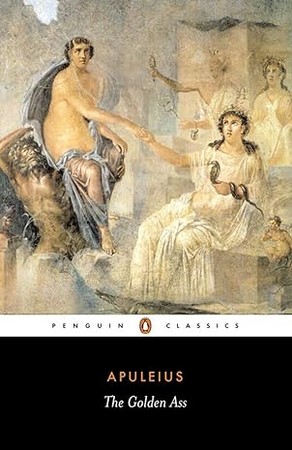
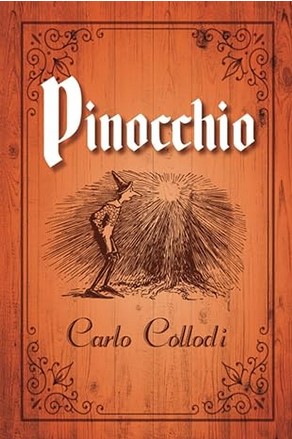
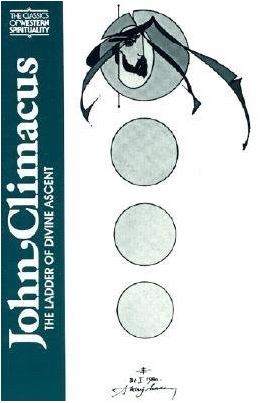
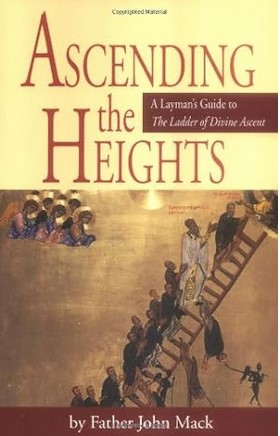
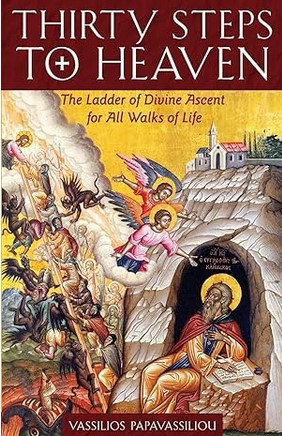
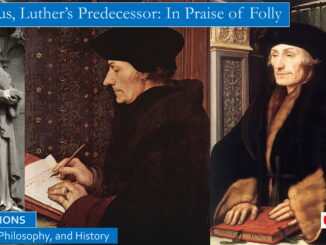
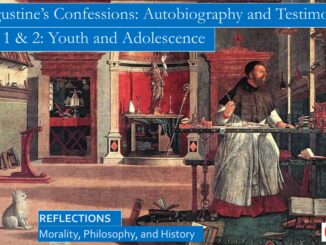
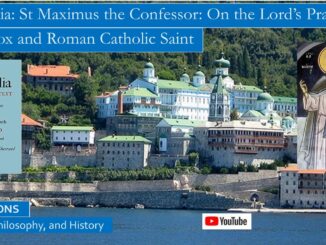
Be the first to comment